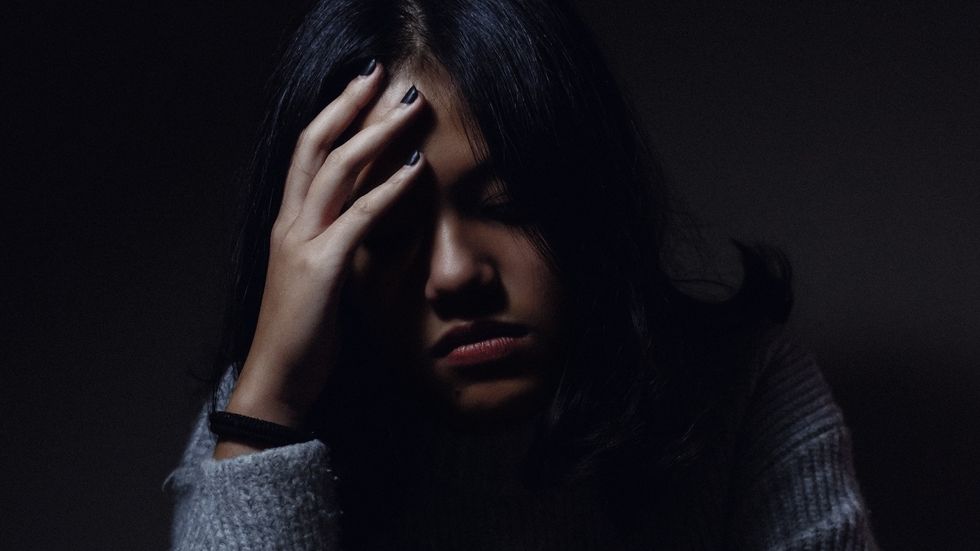Depression is a common diagnosis. Nearly 7% of Americans experience it in some form each year, though that number is likely much higher as many people feel uncomfortable seeking treatment due to the stigma that surrounds the illness.
While leaps and bounds have been made to reverse the stigma against mental illnesses, there is one thing that's not helping — telling people how to treat their diagnosis.
When I was diagnosed with clinical depression and general anxiety, my healthcare provider suggested antidepressants and I took her advice — I've been taking my antidepressants for over a year now. Soon after I first filled my prescription, I came across a post on Facebook with a photo of a forest stating "This is an antidepressant" above of photo of pills stating "This is shit."
That hit hard.
I had struggled with my mental health for years. Too afraid of the stigma surrounding depression, I did not seek treatment or help for my feelings. In high school, I distracted myself with my part-time job, extracurriculars, drinking and recreational drugs.
It wasn't healthy and looking back on it I'm sure only worsened my feelings and symptoms.
My freshman year of college I began running and exercising, which helped to an extent but I was still drowning in my feelings. The relief I felt when I was prescribed an antidepressant was indescribable — and with exercise, self-care and my medication, I finally felt like I had my mental health under control.
And then I see this post, telling me that natural remedies should be my cure-all. That I shouldn't have to take prescriptions to feel better, I should be able to go into the forest and feel at peace. I love the outdoors, don't get me wrong, and being outside definitely helps my mental health — but it didn't help me enough.
The negative stigma surrounding depression is worsened by this rhetoric of "natural is the only way!"
Mental illness diagnoses are not one-size fits all. For some people, a regimen of exercise and activity or being outdoors does help more than medication could. And for some (like me), medication is what makes the difference.
Our brains are funky and not everyone responds to things the same way. Earlier this year, Sarah Silverman shared her struggle with antidepressant tolerance and not being able to rely on medication for help with her depression.
Diseases aren't identical in people and neither is mental illness.
Pretending that what works for some people will work for everyone is only making people feel worse when those things don't work. I can't imagine if I had seen that post before meeting with my healthcare provider — I probably would have canceled and kept trying only "natural" remedies as I had in the past, and likely would have only felt worse.
I am so grateful for the strength I found to seek help, and for the medication that keeps my brain on track. I'm grateful for having options in treating my depression and I encourage everyone to explore their options as well.
If those self-care threads on Instagram just aren't quite making you feel better, talk to your healthcare provider about other options. Mental illness is not one-size fits all, and treatment should never be a cause of shame.
If you are struggling with your mental health, please seek help. Talk to someone — your family, friends, a doctor, a counselor — don't let your depression run rampant and control your life.
There is no shame in seeking help and treatment. There is no shame in taking medications to feel better. There is no shame in having a mental illness.
- Logic's "1-800-273-8255" Is Erasing The Stigma Of Mental Health ›
- Mental Health Discussion ›
- Mental Health: A Constant Battle, Not A Trend ›
- I'm Medicated For My Brain And Totally Okay With It ›
- Why We Need To Speak Up About Mental Illness ›
- There's Nothing Wrong With Medication For Depression ›
- Ten Steps to Empowering the Depressed Mind ›



 StableDiffusion
StableDiffusion StableDiffusion
StableDiffusion StableDiffusion
StableDiffusion Photo by
Photo by  Photo by
Photo by  Photo by
Photo by 
 Photo by
Photo by  Photo by
Photo by  Photo by
Photo by  Photo by
Photo by  Photo by
Photo by 












